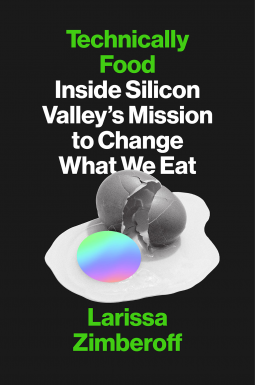
Technically Food
Inside Silicon Valley’s Mission to Change What We Eat
by Larissa Zimberoff
This title was previously available on NetGalley and is now archived.
Buy on Amazon
Buy on BN.com
Buy on Bookshop.org
*This page contains affiliate links, so we may earn a small commission when you make a purchase through links on our site at no additional cost to you.
Send NetGalley books directly to your Kindle or Kindle app
1
To read on a Kindle or Kindle app, please add kindle@netgalley.com as an approved email address to receive files in your Amazon account. Click here for step-by-step instructions.
2
Also find your Kindle email address within your Amazon account, and enter it here.
Pub Date Jun 01 2021 | Archive Date Jun 01 2021
ABRAMS | Abrams Press
Talking about this book? Use #TechnicallyFood #NetGalley. More hashtag tips!
Description
“In a feat of razor-sharp journalism, Zimberoff asks all the right questions about Silicon Valley’s hunger for a tech-driven food system. If you, like me, suspect they’re selling the sizzle more than the steak, read Technically Food for the real story.” —Dan Barber, the chef and co-owner of Blue Hill and Blue Hill at Stone Barns
Eating a veggie burger used to mean consuming a mushy, flavorless patty that you would never confuse with a beef burger. But now products from companies like Beyond Meat, Impossible Foods, Eat Just, and others that were once fringe players in the food space are dominating the media, menus in restaurants, and the refrigerated sections of our grocery stores. With the help of scientists working in futuristic labs––making milk without cows and eggs without chickens––start-ups are creating wholly new food categories. Real food is being replaced by high-tech.
Technically Food: Inside Silicon Valley’s Mission to Change What We Eat by investigative reporter Larissa Zimberoff is the first comprehensive survey of the food companies at the forefront of this booming business. Zimberoff pokes holes in the mania behind today’s changing food landscape to uncover the origins of these mysterious foods and demystify them. These sometimes ultraprocessed and secretly produced foods are cheered by consumers and investors because many are plant-based—often vegan—and help address societal issues like climate change, animal rights, and our planet’s dwindling natural resources. But are these products good for our personal health?
Through news-breaking revelations, Technically Food examines the trade-offs of replacing real food with technology-driven approximations. Chapters go into detail about algae, fungi, pea protein, cultured milk and eggs, upcycled foods, plant-based burgers, vertical farms, cultured meat, and marketing methods. In the final chapter Zimberoff talks to industry voices––including Dan Barber, Mark Cuban, Marion Nestle, and Paul Shapiro––to learn where they see food in 20 years.
As our food system leaps ahead to a sterilized lab of the future, we think we know more about our food than we ever did. But because so much is happening so rapidly, we actually know less about the food we are eating. Until now.
Eating a veggie burger used to mean consuming a mushy, flavorless patty that you would never confuse with a beef burger. But now products from companies like Beyond Meat, Impossible Foods, Eat Just, and others that were once fringe players in the food space are dominating the media, menus in restaurants, and the refrigerated sections of our grocery stores. With the help of scientists working in futuristic labs––making milk without cows and eggs without chickens––start-ups are creating wholly new food categories. Real food is being replaced by high-tech.
Technically Food: Inside Silicon Valley’s Mission to Change What We Eat by investigative reporter Larissa Zimberoff is the first comprehensive survey of the food companies at the forefront of this booming business. Zimberoff pokes holes in the mania behind today’s changing food landscape to uncover the origins of these mysterious foods and demystify them. These sometimes ultraprocessed and secretly produced foods are cheered by consumers and investors because many are plant-based—often vegan—and help address societal issues like climate change, animal rights, and our planet’s dwindling natural resources. But are these products good for our personal health?
Through news-breaking revelations, Technically Food examines the trade-offs of replacing real food with technology-driven approximations. Chapters go into detail about algae, fungi, pea protein, cultured milk and eggs, upcycled foods, plant-based burgers, vertical farms, cultured meat, and marketing methods. In the final chapter Zimberoff talks to industry voices––including Dan Barber, Mark Cuban, Marion Nestle, and Paul Shapiro––to learn where they see food in 20 years.
As our food system leaps ahead to a sterilized lab of the future, we think we know more about our food than we ever did. But because so much is happening so rapidly, we actually know less about the food we are eating. Until now.
A Note From the Publisher
Larissa Zimberoff is a freelance journalist who covers the intersection of food, technology, and business. Her work has appeared in the New York Times, the Wall Street Journal, Bloomberg Businessweek, and many others. Zimberoff often presents on, moderates, and leads panels on food tech including at Stanford, reThink Food at CIA/Napa, and IACP. She splits her time between San Francisco, California, and New York City.
Available Editions
| EDITION | Other Format |
| ISBN | 9781419747090 |
| PRICE | $27.00 (USD) |
| PAGES | 256 |
Readers who liked this book also liked:
Manga Classics: Anne of Green Gables
L.M. Montgomery, Crystal S. Chan, Kuma Chan
Children's Fiction, Comics, Graphic Novels, Manga, Teens & YA
L.M. Montgomery, Crystal S. Chan, Kuma Chan
Children's Fiction, Comics, Graphic Novels, Manga, Teens & YA
The Story She Left Behind
Patti Callahan Henry
General Fiction (Adult), Historical Fiction, Women's Fiction
Patti Callahan Henry
General Fiction (Adult), Historical Fiction, Women's Fiction
Buzz Books 2025: Spring/Summer
Publishers Lunch
General Fiction (Adult), Nonfiction (Adult), Teens & YA
Publishers Lunch
General Fiction (Adult), Nonfiction (Adult), Teens & YA


















